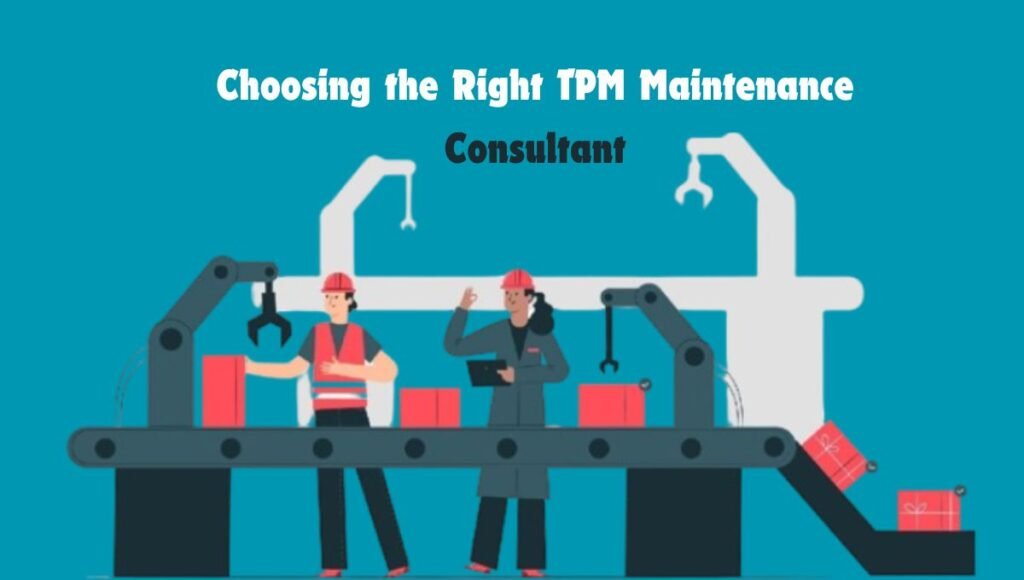In today’s competitive manufacturing landscape, maintaining efficiency and productivity is more crucial than ever. One of the most effective ways to achieve this is through the implementation of Total Productive Maintenance (TPM). However, the journey to successful TPM adoption can be complex and fraught with challenges. This is where a TPM consultant comes in. In this blog, we will explore why your factory needs a TPM consultant, the benefits they bring, and key insights into their role.
What is a TPM Consultant?
A TPM consultant is a professional with specialised knowledge in Total Productive Maintenance. They guide companies through the process of implementing TPM, from initial planning to execution and beyond. These experts bring a wealth of experience and industry-specific knowledge, helping factories to streamline their operations, minimise downtime, and achieve sustainable growth.
Key Responsibilities
- Assessment and Planning: Analysing current maintenance practices and identifying areas for improvement.
- Training and Education: Providing training sessions for employees to equip them with TPM principles and skills.
- Implementation Support: Assisting in the deployment of TPM strategies and monitoring their progress.
- Continuous Improvement: Offering ongoing support to refine and enhance TPM practices.
Benefits of Hiring a TPM Consultant
Expertise and Experience
TPM consultants bring a deep understanding of maintenance best practices and industry standards. Their expertise allows them to identify inefficiencies and recommend effective solutions tailored to your factory’s specific needs. This level of insight is often beyond the reach of in-house teams, who may lack the breadth of experience required to tackle complex maintenance challenges.
Customised Solutions
Every factory is unique, with its own set of processes, equipment, and challenges. A TPM consultant provides customised solutions that address the specific requirements of your facility. They consider factors such as the type of machinery, production goals, and workforce capabilities to develop a tailored TPM plan that maximises efficiency and productivity.
Improved Efficiency and Productivity

One of the primary goals of TPM is to enhance the overall efficiency of manufacturing processes. By implementing proactive maintenance strategies, a TPM consultant helps to reduce equipment downtime, increase production uptime, and ensure smooth operation. This leads to higher productivity and allows your factory to meet its production targets more consistently.
Cost Reduction
Unplanned maintenance and equipment failures can result in significant costs, both in terms of repairs and lost production time. TPM consultants help to establish preventive maintenance schedules that minimise these risks. By reducing the frequency and severity of equipment breakdowns, they help to lower maintenance costs and improve the factory’s bottom line.
Enhanced Employee Skills and Engagement
TPM consultants provide training and support to factory employees, equipping them with the knowledge and skills needed to maintain their equipment effectively. This not only improves the competence of your workforce but also fosters a culture of ownership and responsibility. When employees are actively involved in maintenance activities, they are more engaged and motivated, leading to better performance and job satisfaction.
Accelerated Implementation
Implementing TPM can be a complex and time-consuming process, especially for factories that are new to the concept. A TPM consultant streamlines this process by providing expert guidance and support, helping to avoid common pitfalls and ensuring a faster and more efficient implementation. This allows your factory to start reaping the benefits of TPM sooner rather than later.
Click here to read more : Business
Insights into the Role of a TPM Consultant
Holistic Approach
TPM consultants take a holistic approach to maintenance, considering all aspects of your manufacturing process. They look beyond just equipment maintenance to include factors such as employee training, process optimization, and quality control. This comprehensive perspective ensures that all elements of your factory are aligned towards achieving operational excellence.
Data-Driven Decision Making
A key component of TPM is the use of data to drive maintenance decisions. TPM consultants utilise advanced tools and techniques to collect and analyze data on equipment performance, maintenance activities, and production outcomes. This data-driven approach enables them to make informed recommendations that improve efficiency and productivity.
Long-Term Partnership
Engaging a TPM consultant is not a one-time event but rather the beginning of a long-term partnership. These experts provide ongoing support and guidance, helping your factory to continuously improve its maintenance practices and adapt to changing conditions. This long-term commitment ensures that your factory remains competitive and capable of meeting future challenges.
Conclusion
Hiring a TPM consultant offers a multitude of benefits that can transform your factory’s maintenance practices and boost overall performance. From providing specialized expertise and customized solutions to enhancing employee skills and driving cost reductions, a TPM consultant is an invaluable asset in the journey towards manufacturing excellence. By investing in the expertise of a TPM consultant, your factory can achieve significant improvements in efficiency, productivity, and profitability.
Click here to learn more about TPM consultants: https://www.ribcon.com/



More Stories
PVD-Coated vs. Traditional Furniture: Who win?
PCD Pharma Franchise Company in Baddi: Oasis Bio Bloom
Brass Hose Fittings: Perfect for Any Industry